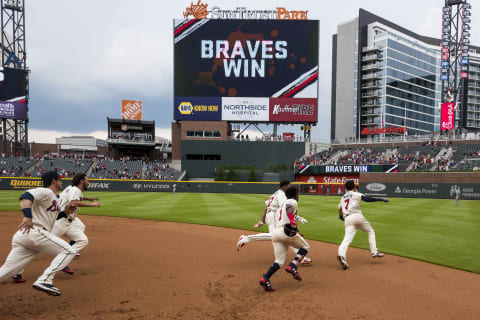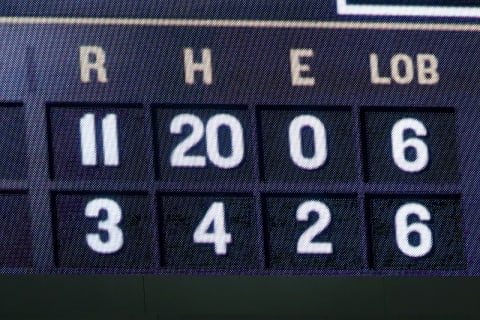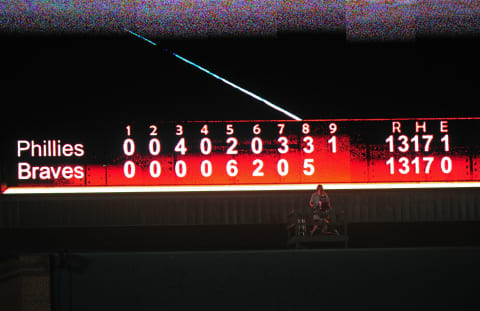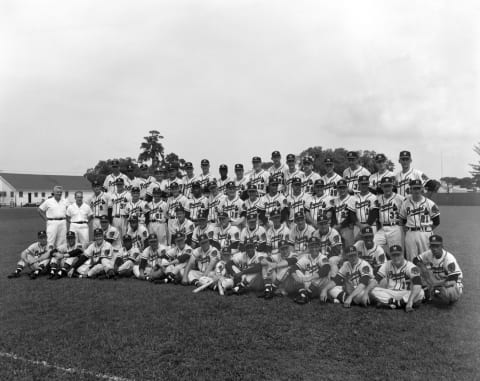Atlanta Braves: the most runs this franchise has scored


Big wins are called ‘laughers’ and our Atlanta Braves have had a few. That seems like something we could all use right now.
The Atlanta Braves – in the history of their franchise – have scored 20-plus in a game six times. There are some interesting bits of trivia that come from those games, so let’s have a little fun at the expense of the teams that were vanquished on those occasions.
6. TWENTY RUNS. BOSTON DOVES (BRAVES), OCT 6, 1910.
This was the first time it happened, and it was also the quickest of the six games… by far.
Can you imagine a 20-7 final score that required just 1 hour and 52 minutes to play?? Moreover, can you imagine a team with 100 losses on the year (they were 50-99 entering this game; 53-100 for the season) destroying another opponent like this?
After spotting the Phillies (then 75-74) 3 runs in the top of the first, the Doves/Braves started back slowly, but really got rolling against starter Bob Ewing in the second. By the end of the third, Ewing (8 runs) was long gone and it was 12-3 in front of a reported crowd of 985.
Philly reliever Charlie Girard seemed to restore order … for a while … but he ended up being charged with the remaining 12 runs. His earned-run count for the game mercifully went unrecorded, though 2 Philadelphia errors might have helped… kinda.
The Doves replaced their starter after the first inning (yes, they used an ‘opener’, it seems), so Al Mattern enjoyed the spoils of war. In fact, he went 3 for 4 at the plate and scored thrice himself.
Boston left fielder Bill Collins was 4 for 6 and hit for the cycle – good timing as it was only his 3rd dinger of the year. Wikipedia reports that this was the FIRST time that feat had been performed in the majors.
The rest of the damage was spread out well: everybody batting got at least one hit and scored as the team OPS for the game was 1.432.

5. TWENTY RUNS. LARGEST MARGIN OF VICTORY. BOSTON BRAVES, SEP 18, 1915.
At least this club was a bit better overall, finishing in 2nd place with an 83-69 record as they attempted to defend their World Series title from 1914. This game took place in St. Louis as the first of a double-header that no-doubt left the home fans wondering why they bothered, for the visitors also took the second game 6-3.
The game was a rout, but was also better pitched by the Braves over their prior break-out game. Starter Dick Rudolph gave up one lone hit in 3 innings of work; his backup Jesse Barnes was credited with a 6 inning save in yielding 8 hits and one run.
We don’t exactly know what happened to the St. Louis starter (Dan Griner). He was (oddly) credited for the Loss despite his line showing no runs allowed – earned or otherwise. We can see that he was replaced at 1 out in the first while having walked one batter.
Still, the Braves put 4 on the board in the 1st and seven more in the 2nd. Then it was more and more crooked numbers late en route to a 20-1 final and a 19-run margin of victory: the franchise record.
The Braves hit no homers, but there were four triples – two from Sherry Magee. Hall of Famers Rabbit Maranville (3 for 4) and Johnny Evers (1 for 4) contributed well – Evers by scoring 4 times.
It was a 1.327 OPS day for this team, and led to a doubleheader sweep.
4. TWENTY RUNS. CARDS TORCHED AGAIN. BOSTON BEES/BRAVES, AUG 25, 1936.
In another year in which this club had trouble figuring out their identity, the “Bees” were pretty poor in 1936. They finished in 6th place (out of 8 teams) and their attendance was even worse (7th in the league).
But here was another road trip to St. Louis. This was a different club from the one that the Doves dismantled 21 years before: just 3 days earlier, the Cards were in first place.
Then their wheels fell off. Big time.
In their next 6 games, St. Louis lost 17-5, 20-3, 5-4, 10-4, 1-0, and 8-0. The lowly Bees were responsible for the middle 4 games of that disaster.
The Cards never recovered and floundered their way to a second-place finish behind the Giants.
In this game, however, the Bees made their statement early … and often. Before starting pitcher Tiny Chaplin took the mound, he had singled in a run, scored himself, and was 3 batters away from coming to the plate again.
1st inning. 11-0.
It was all singles (15), doubles (10), and walks (5) for the Bees. Okay, there were also a pair of Cardinal errors. But 18 of the runs were earned.
Two different Bees/Braves had 3 doubles (Gene Moore and Rabbit Warstler). Moore and Buck Jordan had five hits apiece and only left fielder Hal Lee failed to collect more than 1 hit.
The team OPS for this contest? 1.199.

3. TWENTY RUNS. ATLANTA BRAVES BREAK IN THE NEW KIDS, APRIL 18, 1999
Okay, the Rockies had been playing since 1993, so they weren’t ‘new’ anymore, but for quite a while, the Atlanta Braves truly owned them – that starting with a 13-0 season series sweep during 1993.
But in 1999 the results were largely the same: the Braves went 103-59 (first). The Rockies were 72-90 (last). So at some point, you’d have to think this kind of game might happen. But this was still quite early in the year.
It happened in Denver, but this really looked like a normal contest (by Coors Field standards) for most of the way. In fact, after the third inning, the Rockies had gotten to Greg Maddux for 3 runs to pull within 2 at a 6-4 deficit.
The Braves immediately got those 3 runs back, but didn’t score again until a lone tally in the 8th. So it’s now 10-4 going to the 9th. Looks like an easy win… but at this point you kinda feel bad for Colorado given what was about to happen.
Mike DeJean was the pitching victim. His line was ugly. 5 hits. A walk. A homer. 7 runs allowed (6 earned). He didn’t get anybody out after 7 batters… all of them scored.
Roberto Ramirez was called upon to deal with the mess. 3 more scored. 10 runs total for a 20-4 margin. The Rockies got a token run in their half of the 9th.
Six Braves hitters batted twice in the inning… or would have had Gerald WIlliams not replaced Otis Nixon. That didn’t matter since Williams got in on the party, too, by singling in a run.
In this game, homers were hit by 2 different Joneses (Andruw and Chipper), two different Brians (Hunter and Jordan), and Randall Simon. Andruw Jones also tripled.
Hitting back-to-back in the lineup, Andruw and Eddie Perez both went 5 for 6. Simon was 3 for 3; Chipper 3 for 5. The team OPS? 1.389 with 24 hits.
2. TWENTY RUNS. HAD TO INCLUDE THE MARLINS. ATLANTA BRAVES, OCT. 5, 2001.
After this contest, there were just 2 games left in the season. The Atlanta Braves would win the NL East again. The (Florida) Marlins were in the process of finishing 4th at 76-86.
This game started badly for Atlanta as the visitors to Turner Field parlayed a single and a walk into a 3-0 lead off of Kevin Millwood after a Preston Wilson home run.
Those were the only runs they would get on the night as Millwood ended up going 6 innings.
His counterpart – Marlins starter Ryan Dempster – couldn’t get out of the first inning. Dempster’s replacement (Benito Baez) didn’t get out of the third.
So Chipper, Andruw, and Brian Jordan ended being the only Braves players able to enjoy two 20-run outbursts in the history of this franchise as they were also contributing mightily to that Denver rout as well.
It didn’t quite start that well for Jordan this time: after opening the game with 3 straight walks, Jordan struck out, leaving the Fish with a double-play’s chance of getting out of the inning unscathed.
A sacrifice fly later… things still looked manageable for Dempster. 7 batters later… the Dempster fire was raging.
Dempster walked six in the inning and gave up only 1 hit… a single to Rey Sanchez of all people. But that still added up to six runs!
The big blow? That came off Benito Baez after Dempster couldn’t find the plate with both hands and a map. It was a Chipper Jones grand slam. 10-3 and the rout was on.
Jordan later doubled. Chipper later tripled. Marcus Giles homered, too, as gaudy crooked numbers dotted the line score: 10 in the 1st, 5 in the 3rd, and 5 in the 8th.
20-3 was the final.
This was not the largest victory margin for the team since arriving in Atlanta: that came with an 18-0 drubbing of these Marlins back in 1999. But somehow that ’20’ on the board seems like a bigger number.

1. TWENTY-THREE. THE MOST RUNS SCORED EVER. MILWAUKEE BRAVES, SEPT. 2, 1957.
“Hey – the Cubs scored 10 runs today!”
“Did they win??”
In this case… nope.
This was probably the sloppiest game recounted here, with a total of 33 runs, 40 hits, and 5 errors – plus 8 walks – over 3+ hours in an era when three-hour games were rare.
That’s a bit surprising, given that Lew Burdette (3.88 ERA) was the Braves starter and Bob Rush (4.17 for the Cubs) wasn’t terrible either.
But Rush gave up 6 (5 earned) at Wrigley before the Bleacher Creatures were settled, and Burdette didn’t finish the 3rd inning himself … which ultimately gave Ernie Johnson Sr. the win.
Milwaukee scored in every inning except the 5th and it was multiple runs in those innings except the 7th.
The Cubs tried to keep pace, but after the 3rd inning, the hometown team was still behind 13-7. The final was 23-10.
The Braves had a 1.345 team OPS that day with 2 homers (Eddie Mathews and Wes Covington), 3 triples (Mathews, Frank Torre, and Felix Mantilla, and 6 doubles. Bob Hazle has 3 of those.
Every starter except Burdette had at least two hits (though reliever Johnson went 2 for 4 himself) and the top 7 in the order scored at least 2 runs each.
In the process, Frank Torre scored six times – an all-time franchise record for a single game (Chipper scored 5 times twice, as did six other Braves since Rabbit Maranville set the initial 5-run mark in 1931).
This was the World Series Winning Milwaukee Braves of 1957 – one of the best clubs ever for the franchise. It isn’t a direct correlation to scoring like this all the time, of course, but it does speak to the firepower they possessed.
dark. Next. The Top 5 No. 1 prospect busts
That’s the record-setter: a 23-run game is the most runs scored by any Braves team. So far.